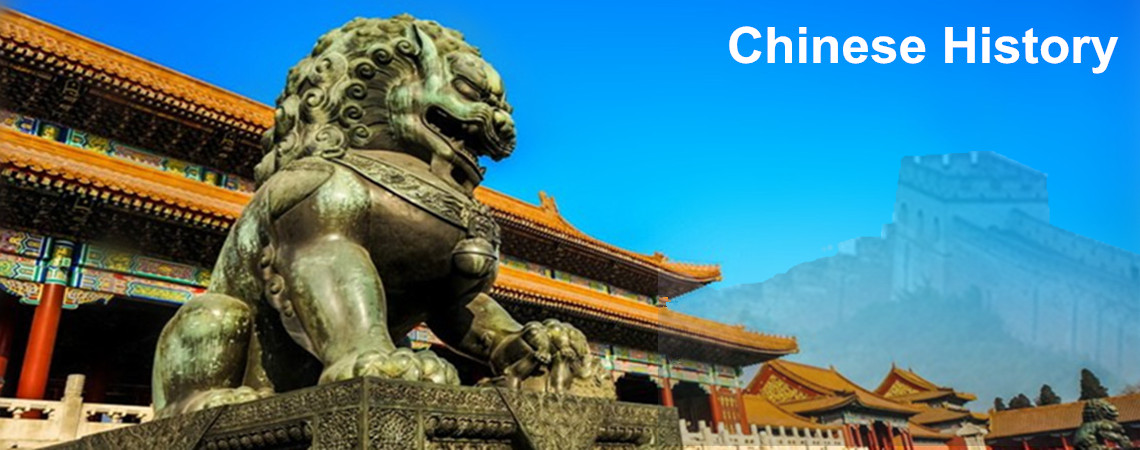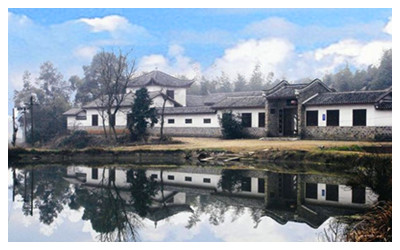
Zuo Zongtang 左宗棠
 Zuo Zongtang was born on November 10, 1812, into a poor family in Xiangyin County, Hunan. Zuo's career got an inauspicious start when, as a young man, he failed the official court exams seven times (ca. 1822-1835). He decided to abandon his plans to become a civil servant and returned to his home by the Xiang River in Hunan to farm silkworms, read, and drink tea. It was during this period that he first directed his attention to the study of Western sciences and political economy.
Zuo Zongtang was born on November 10, 1812, into a poor family in Xiangyin County, Hunan. Zuo's career got an inauspicious start when, as a young man, he failed the official court exams seven times (ca. 1822-1835). He decided to abandon his plans to become a civil servant and returned to his home by the Xiang River in Hunan to farm silkworms, read, and drink tea. It was during this period that he first directed his attention to the study of Western sciences and political economy.
Taiping Rebellion
When the Taiping Rebellion broke out in 1850, Zuo, then 38 years old, was hired as an advisor to Zeng Guofan, the governor of Hunan. In 1856, he was formally offered a position in the provincial government of Hunan. In 1860, Zuo was given command of a force of 5,000 volunteers, the Xiang Army (later known as "Chu Army"), and by September of that year, he drove the Taiping rebels out of Hunan and Guangxi provinces, into coastal Zhejiang. Zuo captured the city of Shaoxing and, from there, pushed south into Fujian and Guangdong provinces, where the revolt had first begun. In 1863, Zuo was appointed Governor of Zhejiang and an Undersecretary of War.
In August 1864, Zuo, together with Zeng Guofan, dethroned the Taiping teenage king, Hong Tianguifu, and brought an end to the rebellion. He was created Earl Kejing of the 1st Class for his part in suppressing the rebellion. He, Zeng Guofan and Li Hongzhang were called Zeng, Zuo, Li, the leaders in suppressing the rebellion.
In 1865, Zuo was appointed Viceroy and Governor-General of Fujian and Zhejiang. As Commissioner of Naval Industries, Zuo founded China's first modern shipyard and naval academy in Fuzhou the following year.
Success and appointments
Zuo's successes would continue. In 1867, he became Viceroy and Governor General of Shaanxi and Gansu and Imperial Commissioner of the Army in Shaanxi. In 1884, his fellow Hunanese Xiang army officer, Liu Jintang, was appointed as the first Governor of Xinjiang province. The Governor of Xinjiang was the subordinate to the Governor General of Shaanxi and Gansu.
In these capacities, he succeeded in putting down another uprising, the Nian Rebellion, in 1868.
After this military success, he marched west with his army of 120,000 people, winning many victories with advanced Western weapons in the Dungan revolt of Northwestern China, including today's Shaanxi, Ningxia, Gansu and Qinghai provinces and Xinjiang, in the 1870s.
Several Muslim generals, such as Ma Zhan'ao, Ma Anliang, Ma Qianling, Dong Fuxiang, and Ma Haiyan from Hezhou, who had defected to General Zuo's army, helped him crush the "Muslim rebels". General Zuo rewarded them by relocating the Han Chinese from the suburbs of Hezhou to another place and allowing their troops to stay in the Hezhou suburbs as long as they did not live in the city itself.
In 1878, he successfully suppressed the Yakub Beg's uprising and helped to negotiate an end to Russian occupation of the border city of Ili. He was vocal in the debate at the Qing Imperial court over what to do with the Xinjiang situation, advocating for Xinjiang to become a province, in opposition to Li Hongzhang, who wanted to abandon what he called "Useless Xinjiang" and concentrate on defending China's coastal areas. However, Zuo won the debate, Xinjiang was made a province, and many administrative functions were staffed by his Hunan officers.
Zuo's Xiang Army troops were armed with modern German Dreyse needle rifles and Krupp artillery, as well as a few experimental weapons Zuo referred to as "sabers of light".
For all his contributions to his nation and monarch, Zuo was appointed a Grand Secretary to the Grand Secretariat in 1874 and elevated to a Marquessate in 1878.
Later life and death
Zuo was appointed to the Grand Council, the cabinet of the Qing Empire at the time, in 1880. Uneasy with bureaucratic politics, Zuo asked to be relieved of his duties and was appointed Viceroy of Liangjiang in 1881. In 1884, upon the outbreak of the Sino-French War, Zuo received his fourth and last commission as commander-in-chief and Imperial Commissioner of the Army and Inspector General overseeing coastal defense in Fujian. He died shortly after a truce was signed between the two nations, in Fuzhou in 1885.
Legacy
Zuo Zongtang was admired by many generals who came after him. The Muslim General Bai Chongxi wanted to reconquer Xinjiang for the Kuomintang central government, in Zuo Zongtang's style, and expelled Russian influence from the area. Zuo Zongtang was also referred to by Muslim General Ma Zhongying (a descendant of a Salar noble) as one of his models, as Ma led the KMT 36th Division (National Revolutionary Army) to re-conquer Xinjiang for the Kuomintang from the pro-Soviet governor Jin Shuren during the Kumul Rebellion.






 Ask Questions ?
Ask Questions ?